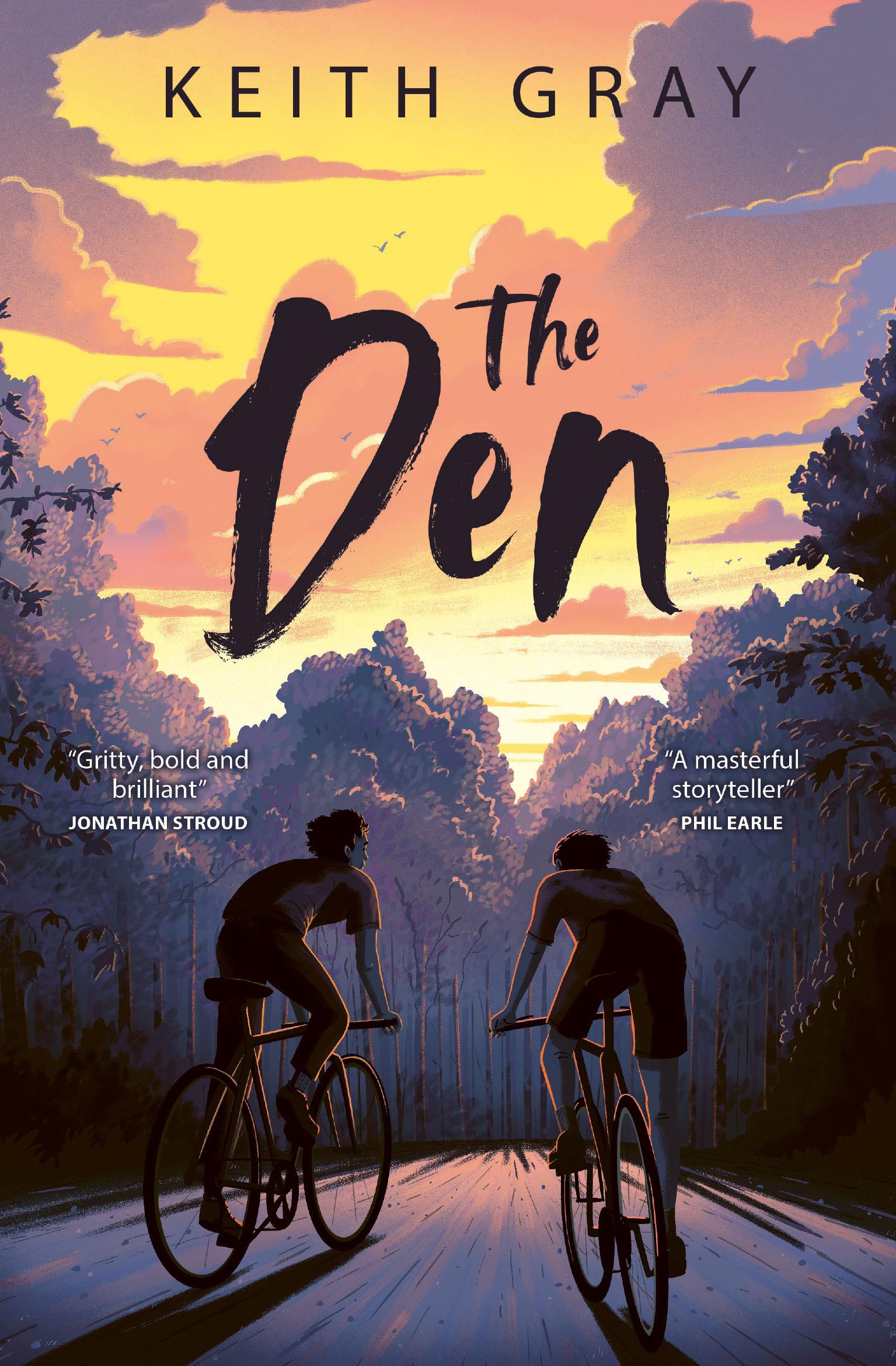Escape‑Mode
I leaned right over my bike’s handlebars, feeling the wind in my face. The rush of air made me scrunch up my eyes.
I rode fast, faster, fastest along the grassy track between the hedges and trees. I slammed up a gear and rammed the pedals round. I imagined I had elastic ropes, bungee cords as thick as my dad’s arms, tied to my bike’s seat. But if I pedalled really hard and really fast, maybe I’d stretch the cords … Stretch them … Snap them! And ride free.
Rory was right there with me. He was racing me, chasing me. His face was sweaty, his dark hair glued to his forehead. He was wearing his summer shorts and his legs were like skinny but powerful pistons. There was no way Rory would let me beat him.
Until he swallowed a fly.
1
One moment Rory was head down and pedalling hard. The next he jerked upright and made a noise like a burping dog.
Rory wobbled, his feet scuffed the ground and his handlebars twisted in his grip. He hit the hedgerow with a crash of leaves and branches. Rory tumbled over with his bike on top of him.
I didn’t want to stop. I looked further up the track. But I braked and skidded, sending up a cloud of summer dust. Reluctantly I turned and rode back towards the tangle of Rory and his bike.
“You OK?” I asked.
“A bee,” Rory gasped. He crawled out from under his bike and spat in the grass. “I swallowed a bee.”
Every year, Rory always wore shorts, from the first day of the summer holidays until the last. Rain or shine. He was wearing his favourite pair of shorts that day. They were military green, came down to the knee, with cargo pockets. He had bloody scratches on his bare shins where the branches of the bush had clawed at him.
I was wearing jeans and the only clean T‑shirt
I’d been able to find. It was baggy and red.
2
“It was probably a fly,” I told him.
“It was totally a bee, Marshall,” Rory told me. “I saw it coming for me. It was aiming at me.”
“I can’t see any bees,” I said.
“Because I’ve swallowed them all now, haven’t I?” Rory replied. “I can feel it in my throat.” He put his fingers in his mouth as if he could pluck it out.
I slid off my pedals, putting my feet on the ground for the first time since leaving home earlier. “Maybe it was a butterfly?” I asked.
Rory’s eyes were watering. “I know a bee when I see one. It’ll die now I’ve swallowed it, right?”
“Are you scared it’s going to sting your arse on the way out?”
Rory gurgled and gobbed a green string of goz into the grass. “Tastes like crap,” he said.
“Must be a fly,” I said. “Bees taste of honey.”
“Should I google it?” Rory asked. “I need to google it, right? Find out what happens to bees inside you.”
3
I rocked my bike beneath me, keen to get going again.
The early morning sun looked about as round and yellow as a toddler’s drawing. The sky was wide, wide open. A line of electricity pylons stretched north, cutting across the track and striding above our heads. Lazy sheep dotted the flat fields. The lonely wind turbine on Given Hill spun slow but strong.
And we couldn’t see it but we could hear Crikey’s Dog Hotel. Because you could always hear Crikey’s Dog Hotel. It used to be an airfield and barracks for American soldiers in the Second World War. Then the buildings had been turned into kennels and were used by holiday‑makers who couldn’t or wouldn’t take their noisy mutts away with them.
We could hear the barking even here, slapping sounds in the still air. It felt like you’d fallen off the edge of the world if you ever went anywhere and couldn’t hear them.
Rory dragged the front end of his bike out of the hedge and checked his tyre for thorns. “Where we going anyway?” he said. “We could go back to mine and see if anyone’s online. Sam and Trev said they’d be up for a game of—”
4
“Why would I want anything to do with them?” I asked.
Rory spun his wheel again, re‑checking the tyre.
I’d had to twist Rory’s arm into coming with me on our bikes this morning. I didn’t want to be inside, trapped. I wanted to be outside, free.
“I’m in escape‑mode,” I said. “I just want to be as far from my house as possible.”
Rory kept his eyes on his tyre as he asked, “Because of your dad?”
“Obviously,” I said.
We were thirteen and had been friends for years. I was taller than Rory but he was proud that he had more muscles than me. I was skinny and wiry.
Rory knew what my dad could be like. “You all right?” he asked. He couldn’t look me in the eye when he asked those kinds of questions. He stared at his spinning tyre.
“My dad’s a loser,” I said. I’d dodged a proper answer but still made Rory look even more uncomfortable. I kicked my bike’s pedals round and round. “I just think that it’s the first day of
5
the summer holidays, so I reckon we should do something new and amazing and different.”
Rory got back on his bike. “You know there’s been nothing new or different around here since the Jurassic Period? And we both know the problem with living in the middle of nowhere is that there’s nowhere to go.”
I shrugged.
Rory shrugged too.
Then he said, “What about seeing what’s been done to Skelter Cottage?”
“We’ve been there a million times,” I said, unimpressed.
“Not for ages,” Rory said. “Not since last summer.”
Skelter Cottage was an abandoned and broken‑down house on the edge of the woods. It was where we used to dare each other to play as little kids because everyone reckoned it was a hundred years old and haunted. Even so, it was true that it’d been ages since we’d bothered going that far on our bikes.
“It’s been knocked down,” Rory said.
6
“Knocked down?”
“That’s what I heard,” Rory said. “Total bulldozer carnage!”
Maybe I thought haunted houses sounded silly and childish these days but somehow I liked the sound of total bulldozer carnage. Also, it would take us at least half an hour to ride to Skelter Woods and I reckoned any time further away from home sounded like a good idea.
7




